Reflective Learning: Feedback and Improving Future Assessments
VerifiedAdded on 2023/06/12
|9
|1919
|259
Essay
AI Summary
This essay discusses the importance of reflective learning in higher education, highlighting how a reflective approach to feedback and feedforward can improve future formative and summative assessed work. It outlines various learning styles, including Gibb's Reflective Cycle, Kolb's theory of learning, and the VARK model, emphasizing their role in enhancing the learning process. The essay also explores the nature of feedback and feedforward, explaining how they provide constructive recommendations for students to improve their performance. Furthermore, it describes how a reflective approach to these practices can inform and improve future assessments, fostering a motivating and aspirational learning experience. The analysis concludes that active participation and reflective practices are essential for students to manage their time and academics effectively in higher education.
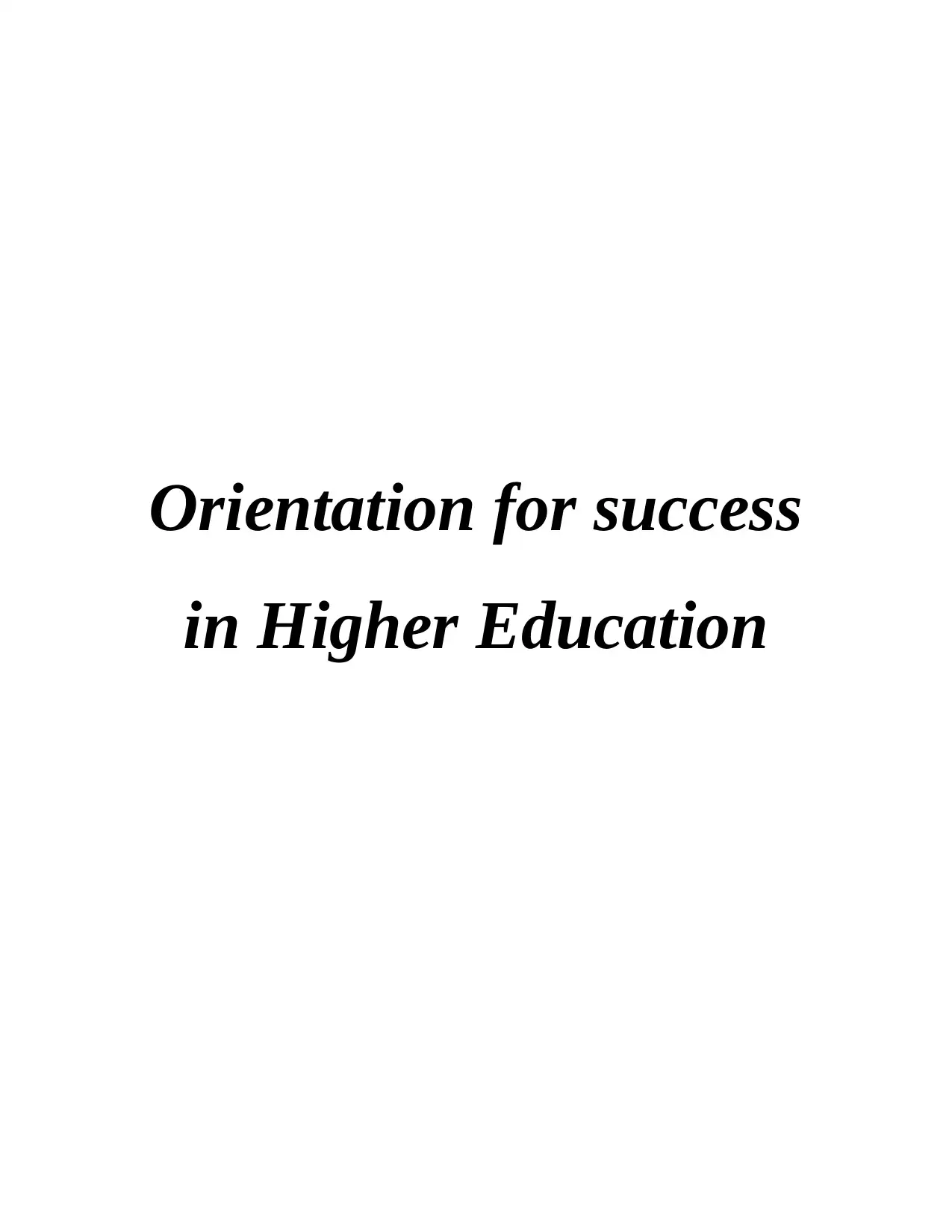
Orientation for success
in Higher Education
in Higher Education
Paraphrase This Document
Need a fresh take? Get an instant paraphrase of this document with our AI Paraphraser
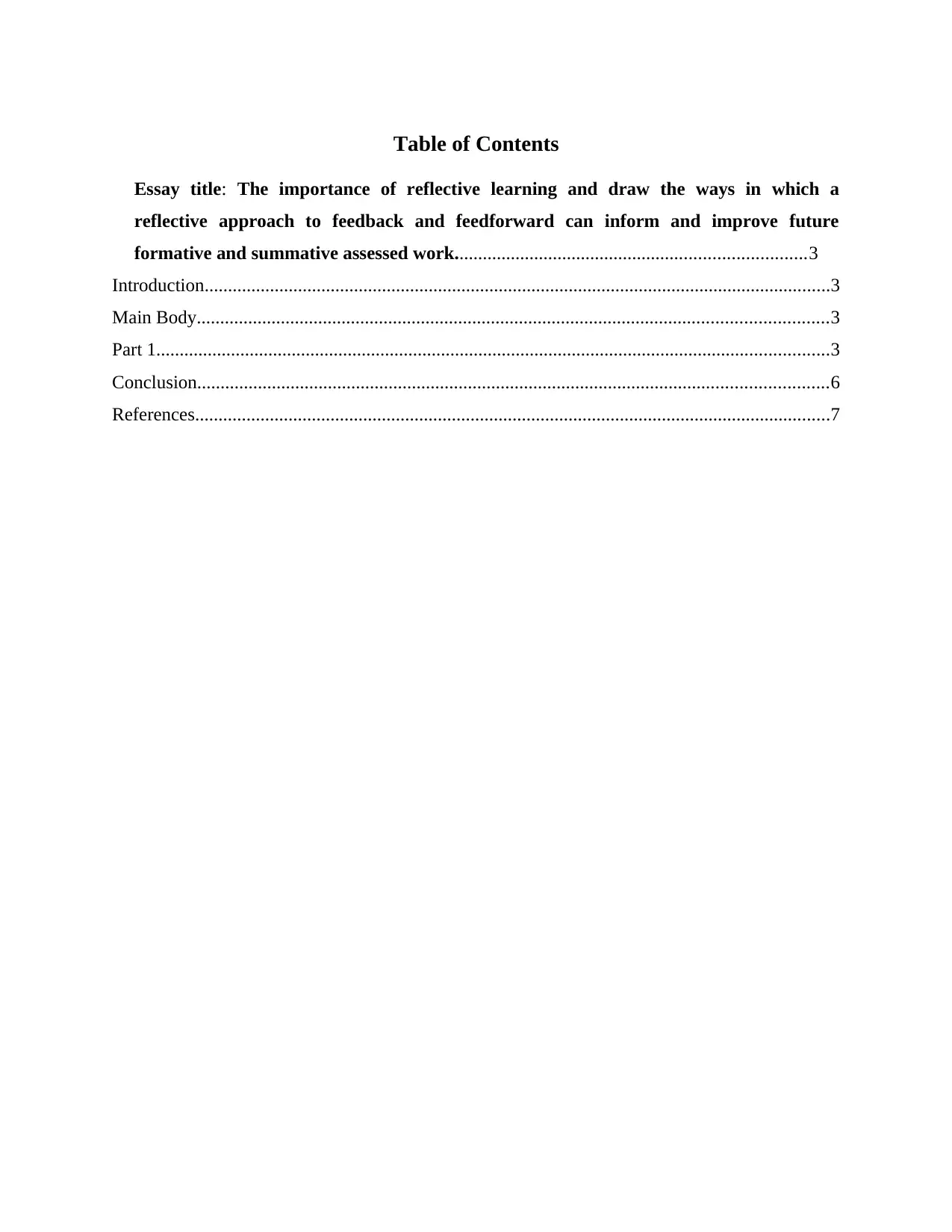
Table of Contents
Essay title: The importance of reflective learning and draw the ways in which a
reflective approach to feedback and feedforward can inform and improve future
formative and summative assessed work...........................................................................3
Introduction......................................................................................................................................3
Main Body.......................................................................................................................................3
Part 1................................................................................................................................................3
Conclusion.......................................................................................................................................6
References........................................................................................................................................7
Essay title: The importance of reflective learning and draw the ways in which a
reflective approach to feedback and feedforward can inform and improve future
formative and summative assessed work...........................................................................3
Introduction......................................................................................................................................3
Main Body.......................................................................................................................................3
Part 1................................................................................................................................................3
Conclusion.......................................................................................................................................6
References........................................................................................................................................7
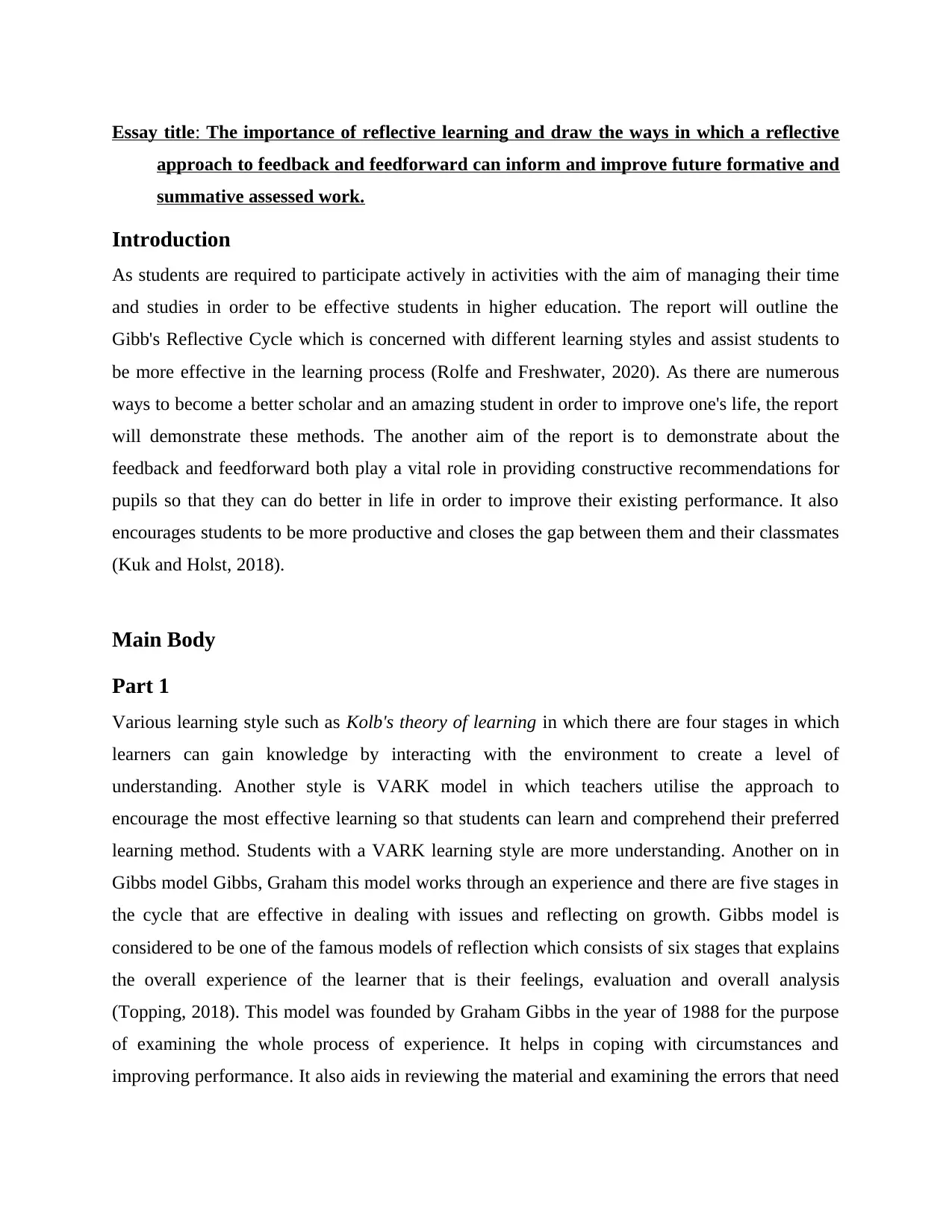
Essay title: The importance of reflective learning and draw the ways in which a reflective
approach to feedback and feedforward can inform and improve future formative and
summative assessed work.
Introduction
As students are required to participate actively in activities with the aim of managing their time
and studies in order to be effective students in higher education. The report will outline the
Gibb's Reflective Cycle which is concerned with different learning styles and assist students to
be more effective in the learning process (Rolfe and Freshwater, 2020). As there are numerous
ways to become a better scholar and an amazing student in order to improve one's life, the report
will demonstrate these methods. The another aim of the report is to demonstrate about the
feedback and feedforward both play a vital role in providing constructive recommendations for
pupils so that they can do better in life in order to improve their existing performance. It also
encourages students to be more productive and closes the gap between them and their classmates
(Kuk and Holst, 2018).
Main Body
Part 1
Various learning style such as Kolb's theory of learning in which there are four stages in which
learners can gain knowledge by interacting with the environment to create a level of
understanding. Another style is VARK model in which teachers utilise the approach to
encourage the most effective learning so that students can learn and comprehend their preferred
learning method. Students with a VARK learning style are more understanding. Another on in
Gibbs model Gibbs, Graham this model works through an experience and there are five stages in
the cycle that are effective in dealing with issues and reflecting on growth. Gibbs model is
considered to be one of the famous models of reflection which consists of six stages that explains
the overall experience of the learner that is their feelings, evaluation and overall analysis
(Topping, 2018). This model was founded by Graham Gibbs in the year of 1988 for the purpose
of examining the whole process of experience. It helps in coping with circumstances and
improving performance. It also aids in reviewing the material and examining the errors that need
approach to feedback and feedforward can inform and improve future formative and
summative assessed work.
Introduction
As students are required to participate actively in activities with the aim of managing their time
and studies in order to be effective students in higher education. The report will outline the
Gibb's Reflective Cycle which is concerned with different learning styles and assist students to
be more effective in the learning process (Rolfe and Freshwater, 2020). As there are numerous
ways to become a better scholar and an amazing student in order to improve one's life, the report
will demonstrate these methods. The another aim of the report is to demonstrate about the
feedback and feedforward both play a vital role in providing constructive recommendations for
pupils so that they can do better in life in order to improve their existing performance. It also
encourages students to be more productive and closes the gap between them and their classmates
(Kuk and Holst, 2018).
Main Body
Part 1
Various learning style such as Kolb's theory of learning in which there are four stages in which
learners can gain knowledge by interacting with the environment to create a level of
understanding. Another style is VARK model in which teachers utilise the approach to
encourage the most effective learning so that students can learn and comprehend their preferred
learning method. Students with a VARK learning style are more understanding. Another on in
Gibbs model Gibbs, Graham this model works through an experience and there are five stages in
the cycle that are effective in dealing with issues and reflecting on growth. Gibbs model is
considered to be one of the famous models of reflection which consists of six stages that explains
the overall experience of the learner that is their feelings, evaluation and overall analysis
(Topping, 2018). This model was founded by Graham Gibbs in the year of 1988 for the purpose
of examining the whole process of experience. It helps in coping with circumstances and
improving performance. It also aids in reviewing the material and examining the errors that need
⊘ This is a preview!⊘
Do you want full access?
Subscribe today to unlock all pages.

Trusted by 1+ million students worldwide
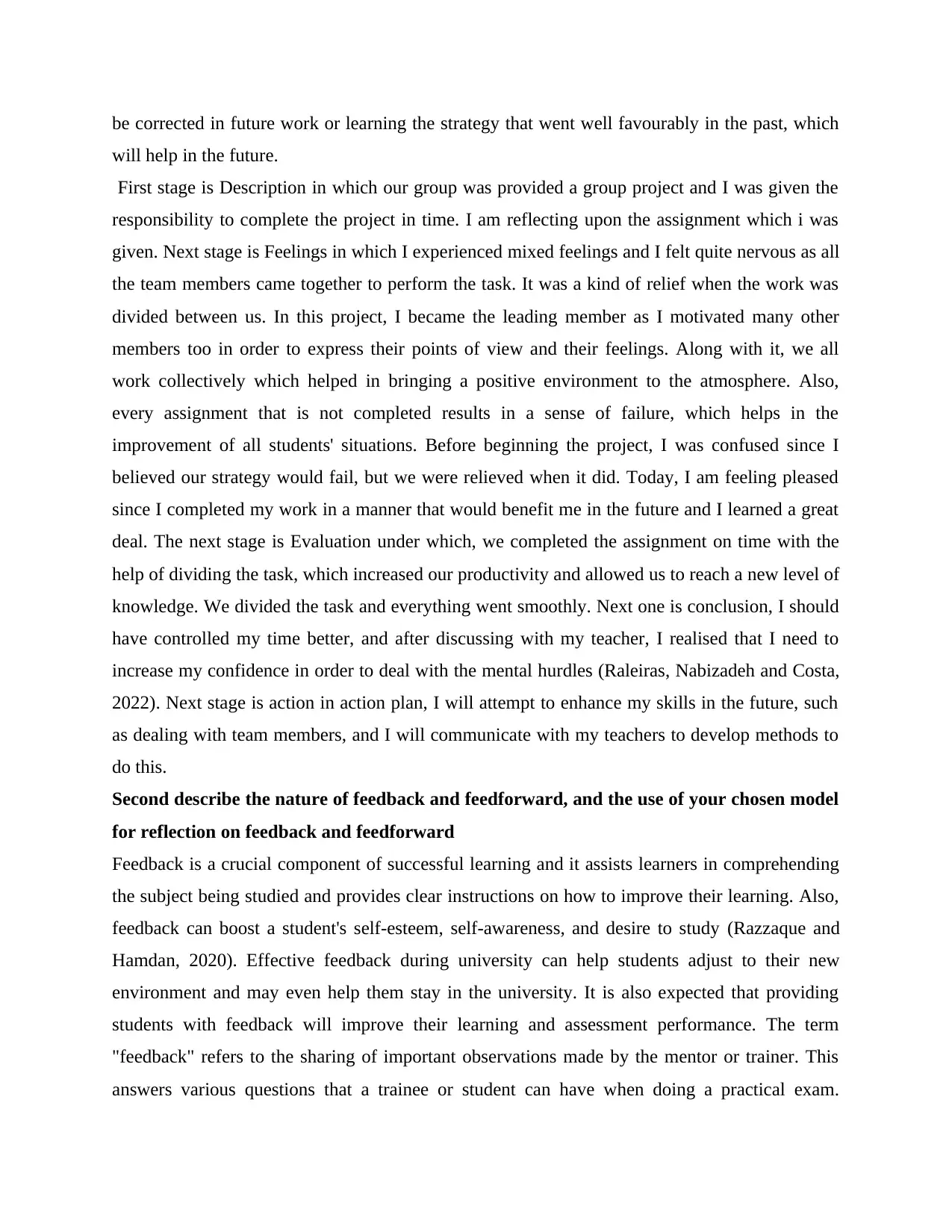
be corrected in future work or learning the strategy that went well favourably in the past, which
will help in the future.
First stage is Description in which our group was provided a group project and I was given the
responsibility to complete the project in time. I am reflecting upon the assignment which i was
given. Next stage is Feelings in which I experienced mixed feelings and I felt quite nervous as all
the team members came together to perform the task. It was a kind of relief when the work was
divided between us. In this project, I became the leading member as I motivated many other
members too in order to express their points of view and their feelings. Along with it, we all
work collectively which helped in bringing a positive environment to the atmosphere. Also,
every assignment that is not completed results in a sense of failure, which helps in the
improvement of all students' situations. Before beginning the project, I was confused since I
believed our strategy would fail, but we were relieved when it did. Today, I am feeling pleased
since I completed my work in a manner that would benefit me in the future and I learned a great
deal. The next stage is Evaluation under which, we completed the assignment on time with the
help of dividing the task, which increased our productivity and allowed us to reach a new level of
knowledge. We divided the task and everything went smoothly. Next one is conclusion, I should
have controlled my time better, and after discussing with my teacher, I realised that I need to
increase my confidence in order to deal with the mental hurdles (Raleiras, Nabizadeh and Costa,
2022). Next stage is action in action plan, I will attempt to enhance my skills in the future, such
as dealing with team members, and I will communicate with my teachers to develop methods to
do this.
Second describe the nature of feedback and feedforward, and the use of your chosen model
for reflection on feedback and feedforward
Feedback is a crucial component of successful learning and it assists learners in comprehending
the subject being studied and provides clear instructions on how to improve their learning. Also,
feedback can boost a student's self-esteem, self-awareness, and desire to study (Razzaque and
Hamdan, 2020). Effective feedback during university can help students adjust to their new
environment and may even help them stay in the university. It is also expected that providing
students with feedback will improve their learning and assessment performance. The term
"feedback" refers to the sharing of important observations made by the mentor or trainer. This
answers various questions that a trainee or student can have when doing a practical exam.
will help in the future.
First stage is Description in which our group was provided a group project and I was given the
responsibility to complete the project in time. I am reflecting upon the assignment which i was
given. Next stage is Feelings in which I experienced mixed feelings and I felt quite nervous as all
the team members came together to perform the task. It was a kind of relief when the work was
divided between us. In this project, I became the leading member as I motivated many other
members too in order to express their points of view and their feelings. Along with it, we all
work collectively which helped in bringing a positive environment to the atmosphere. Also,
every assignment that is not completed results in a sense of failure, which helps in the
improvement of all students' situations. Before beginning the project, I was confused since I
believed our strategy would fail, but we were relieved when it did. Today, I am feeling pleased
since I completed my work in a manner that would benefit me in the future and I learned a great
deal. The next stage is Evaluation under which, we completed the assignment on time with the
help of dividing the task, which increased our productivity and allowed us to reach a new level of
knowledge. We divided the task and everything went smoothly. Next one is conclusion, I should
have controlled my time better, and after discussing with my teacher, I realised that I need to
increase my confidence in order to deal with the mental hurdles (Raleiras, Nabizadeh and Costa,
2022). Next stage is action in action plan, I will attempt to enhance my skills in the future, such
as dealing with team members, and I will communicate with my teachers to develop methods to
do this.
Second describe the nature of feedback and feedforward, and the use of your chosen model
for reflection on feedback and feedforward
Feedback is a crucial component of successful learning and it assists learners in comprehending
the subject being studied and provides clear instructions on how to improve their learning. Also,
feedback can boost a student's self-esteem, self-awareness, and desire to study (Razzaque and
Hamdan, 2020). Effective feedback during university can help students adjust to their new
environment and may even help them stay in the university. It is also expected that providing
students with feedback will improve their learning and assessment performance. The term
"feedback" refers to the sharing of important observations made by the mentor or trainer. This
answers various questions that a trainee or student can have when doing a practical exam.
Paraphrase This Document
Need a fresh take? Get an instant paraphrase of this document with our AI Paraphraser
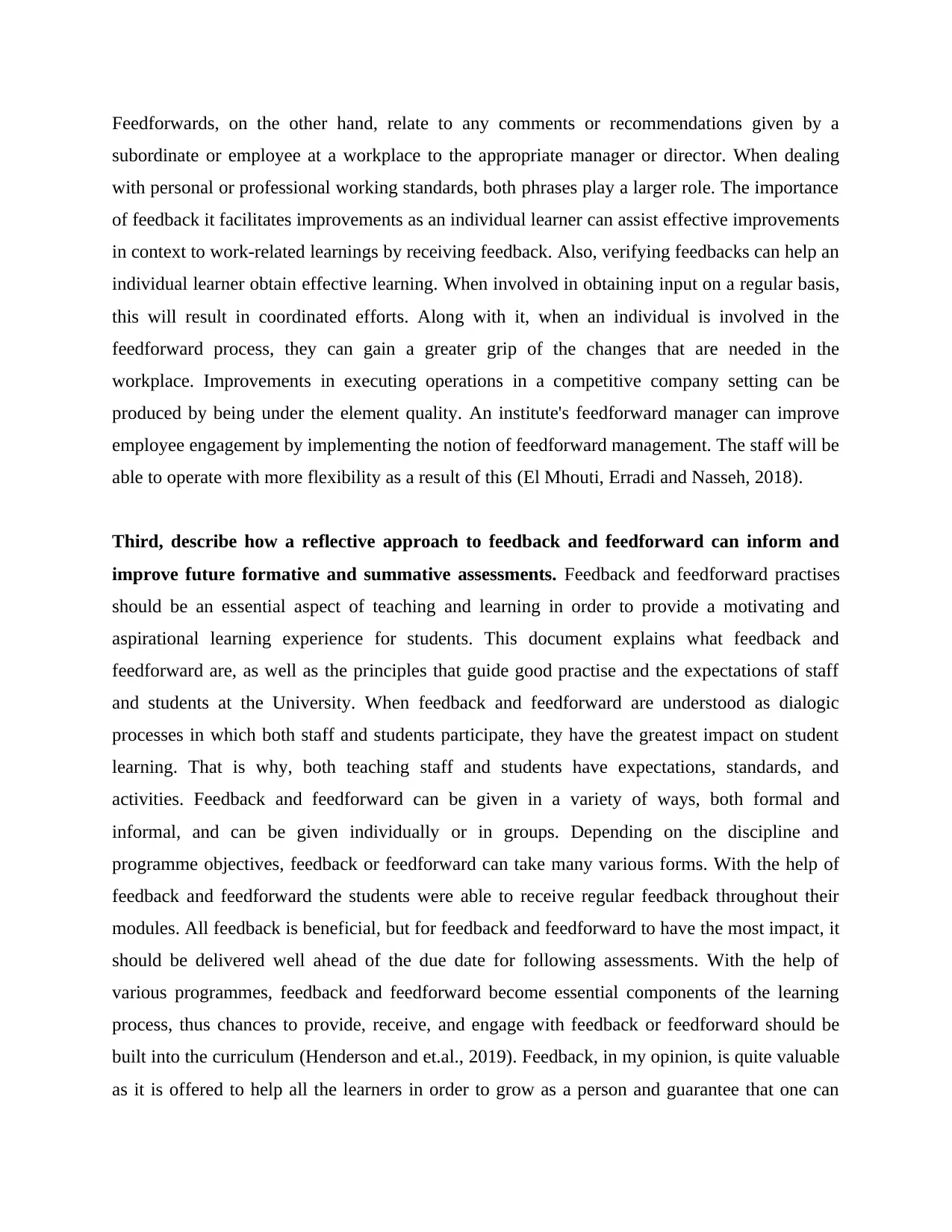
Feedforwards, on the other hand, relate to any comments or recommendations given by a
subordinate or employee at a workplace to the appropriate manager or director. When dealing
with personal or professional working standards, both phrases play a larger role. The importance
of feedback it facilitates improvements as an individual learner can assist effective improvements
in context to work-related learnings by receiving feedback. Also, verifying feedbacks can help an
individual learner obtain effective learning. When involved in obtaining input on a regular basis,
this will result in coordinated efforts. Along with it, when an individual is involved in the
feedforward process, they can gain a greater grip of the changes that are needed in the
workplace. Improvements in executing operations in a competitive company setting can be
produced by being under the element quality. An institute's feedforward manager can improve
employee engagement by implementing the notion of feedforward management. The staff will be
able to operate with more flexibility as a result of this (El Mhouti, Erradi and Nasseh, 2018).
Third, describe how a reflective approach to feedback and feedforward can inform and
improve future formative and summative assessments. Feedback and feedforward practises
should be an essential aspect of teaching and learning in order to provide a motivating and
aspirational learning experience for students. This document explains what feedback and
feedforward are, as well as the principles that guide good practise and the expectations of staff
and students at the University. When feedback and feedforward are understood as dialogic
processes in which both staff and students participate, they have the greatest impact on student
learning. That is why, both teaching staff and students have expectations, standards, and
activities. Feedback and feedforward can be given in a variety of ways, both formal and
informal, and can be given individually or in groups. Depending on the discipline and
programme objectives, feedback or feedforward can take many various forms. With the help of
feedback and feedforward the students were able to receive regular feedback throughout their
modules. All feedback is beneficial, but for feedback and feedforward to have the most impact, it
should be delivered well ahead of the due date for following assessments. With the help of
various programmes, feedback and feedforward become essential components of the learning
process, thus chances to provide, receive, and engage with feedback or feedforward should be
built into the curriculum (Henderson and et.al., 2019). Feedback, in my opinion, is quite valuable
as it is offered to help all the learners in order to grow as a person and guarantee that one can
subordinate or employee at a workplace to the appropriate manager or director. When dealing
with personal or professional working standards, both phrases play a larger role. The importance
of feedback it facilitates improvements as an individual learner can assist effective improvements
in context to work-related learnings by receiving feedback. Also, verifying feedbacks can help an
individual learner obtain effective learning. When involved in obtaining input on a regular basis,
this will result in coordinated efforts. Along with it, when an individual is involved in the
feedforward process, they can gain a greater grip of the changes that are needed in the
workplace. Improvements in executing operations in a competitive company setting can be
produced by being under the element quality. An institute's feedforward manager can improve
employee engagement by implementing the notion of feedforward management. The staff will be
able to operate with more flexibility as a result of this (El Mhouti, Erradi and Nasseh, 2018).
Third, describe how a reflective approach to feedback and feedforward can inform and
improve future formative and summative assessments. Feedback and feedforward practises
should be an essential aspect of teaching and learning in order to provide a motivating and
aspirational learning experience for students. This document explains what feedback and
feedforward are, as well as the principles that guide good practise and the expectations of staff
and students at the University. When feedback and feedforward are understood as dialogic
processes in which both staff and students participate, they have the greatest impact on student
learning. That is why, both teaching staff and students have expectations, standards, and
activities. Feedback and feedforward can be given in a variety of ways, both formal and
informal, and can be given individually or in groups. Depending on the discipline and
programme objectives, feedback or feedforward can take many various forms. With the help of
feedback and feedforward the students were able to receive regular feedback throughout their
modules. All feedback is beneficial, but for feedback and feedforward to have the most impact, it
should be delivered well ahead of the due date for following assessments. With the help of
various programmes, feedback and feedforward become essential components of the learning
process, thus chances to provide, receive, and engage with feedback or feedforward should be
built into the curriculum (Henderson and et.al., 2019). Feedback, in my opinion, is quite valuable
as it is offered to help all the learners in order to grow as a person and guarantee that one can
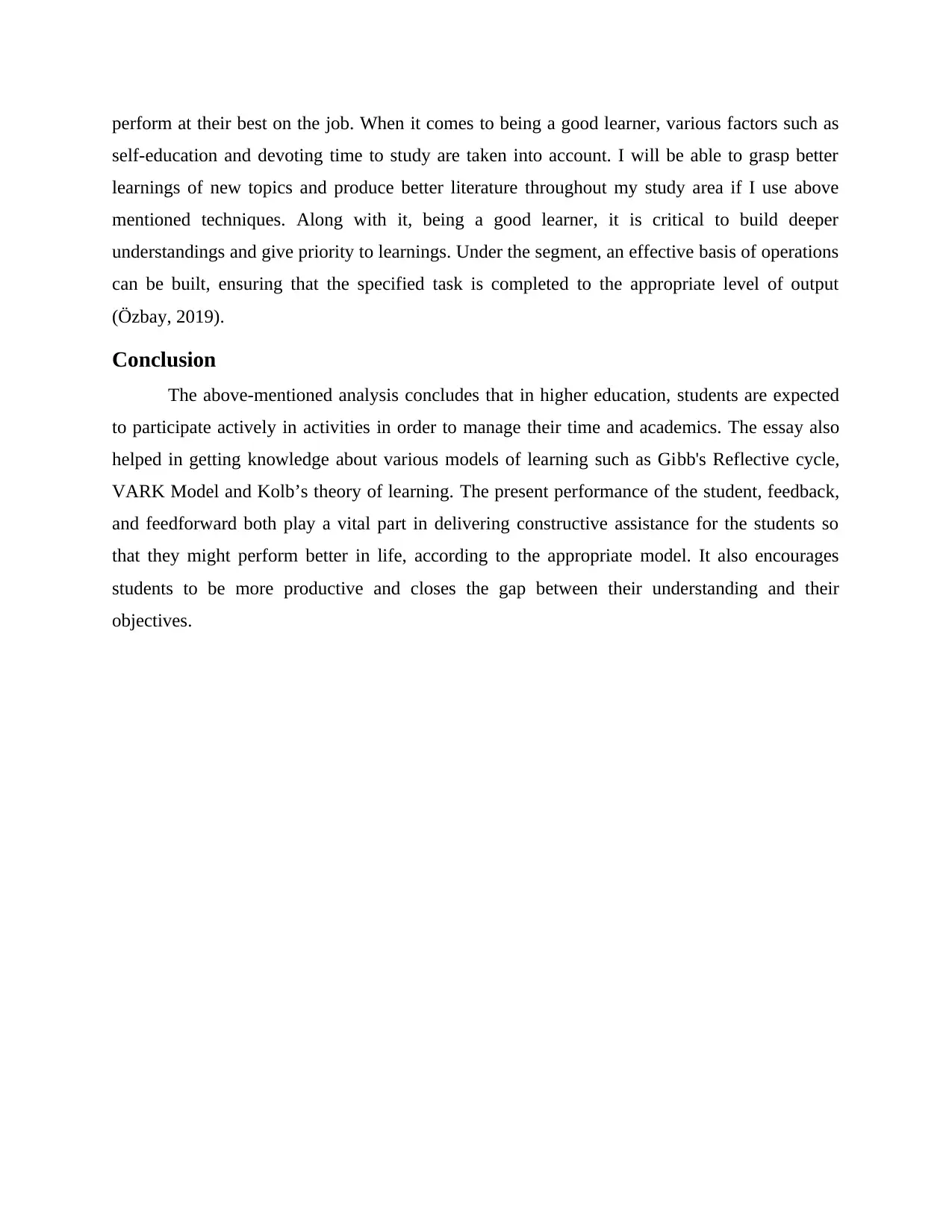
perform at their best on the job. When it comes to being a good learner, various factors such as
self-education and devoting time to study are taken into account. I will be able to grasp better
learnings of new topics and produce better literature throughout my study area if I use above
mentioned techniques. Along with it, being a good learner, it is critical to build deeper
understandings and give priority to learnings. Under the segment, an effective basis of operations
can be built, ensuring that the specified task is completed to the appropriate level of output
(Özbay, 2019).
Conclusion
The above-mentioned analysis concludes that in higher education, students are expected
to participate actively in activities in order to manage their time and academics. The essay also
helped in getting knowledge about various models of learning such as Gibb's Reflective cycle,
VARK Model and Kolb’s theory of learning. The present performance of the student, feedback,
and feedforward both play a vital part in delivering constructive assistance for the students so
that they might perform better in life, according to the appropriate model. It also encourages
students to be more productive and closes the gap between their understanding and their
objectives.
self-education and devoting time to study are taken into account. I will be able to grasp better
learnings of new topics and produce better literature throughout my study area if I use above
mentioned techniques. Along with it, being a good learner, it is critical to build deeper
understandings and give priority to learnings. Under the segment, an effective basis of operations
can be built, ensuring that the specified task is completed to the appropriate level of output
(Özbay, 2019).
Conclusion
The above-mentioned analysis concludes that in higher education, students are expected
to participate actively in activities in order to manage their time and academics. The essay also
helped in getting knowledge about various models of learning such as Gibb's Reflective cycle,
VARK Model and Kolb’s theory of learning. The present performance of the student, feedback,
and feedforward both play a vital part in delivering constructive assistance for the students so
that they might perform better in life, according to the appropriate model. It also encourages
students to be more productive and closes the gap between their understanding and their
objectives.
⊘ This is a preview!⊘
Do you want full access?
Subscribe today to unlock all pages.

Trusted by 1+ million students worldwide
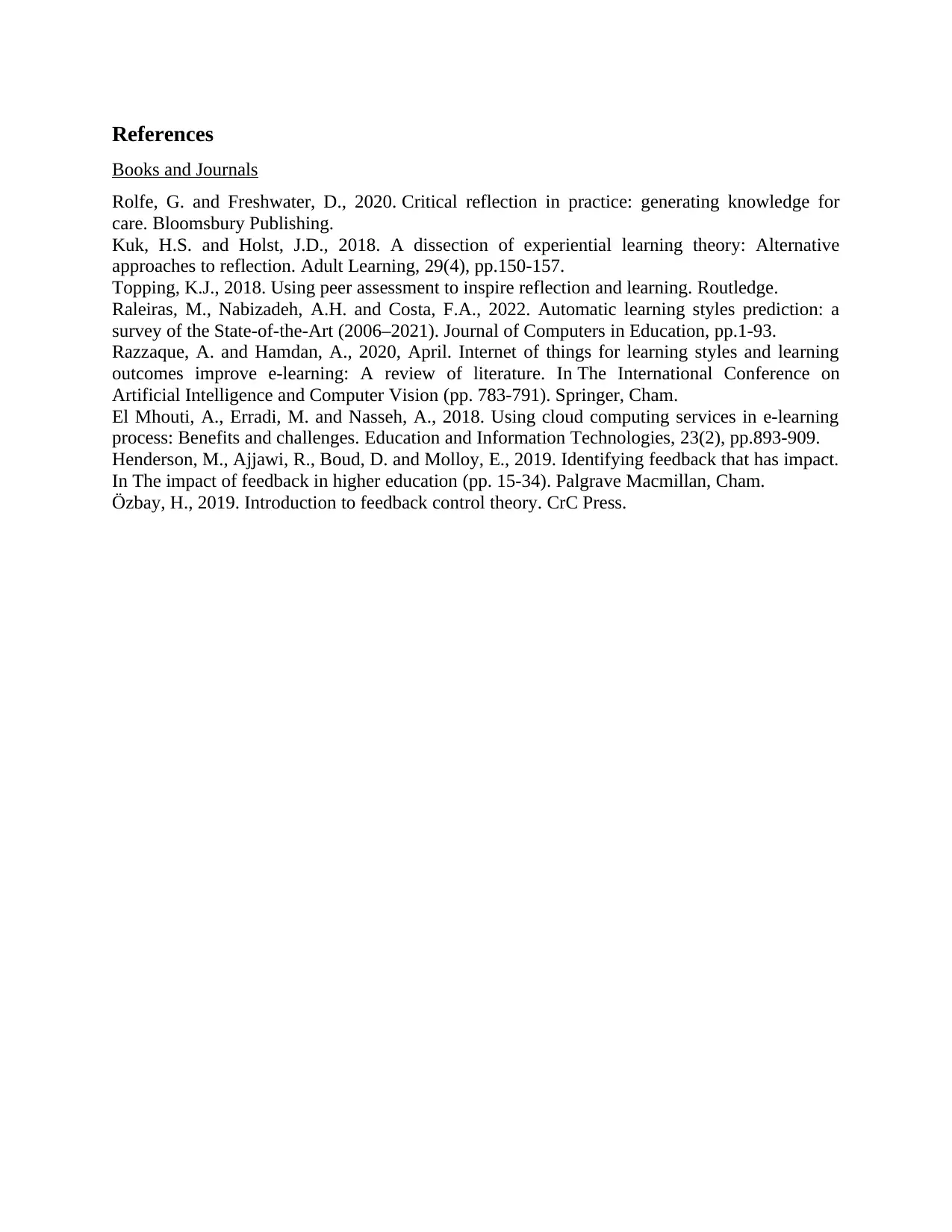
References
Books and Journals
Rolfe, G. and Freshwater, D., 2020. Critical reflection in practice: generating knowledge for
care. Bloomsbury Publishing.
Kuk, H.S. and Holst, J.D., 2018. A dissection of experiential learning theory: Alternative
approaches to reflection. Adult Learning, 29(4), pp.150-157.
Topping, K.J., 2018. Using peer assessment to inspire reflection and learning. Routledge.
Raleiras, M., Nabizadeh, A.H. and Costa, F.A., 2022. Automatic learning styles prediction: a
survey of the State-of-the-Art (2006–2021). Journal of Computers in Education, pp.1-93.
Razzaque, A. and Hamdan, A., 2020, April. Internet of things for learning styles and learning
outcomes improve e-learning: A review of literature. In The International Conference on
Artificial Intelligence and Computer Vision (pp. 783-791). Springer, Cham.
El Mhouti, A., Erradi, M. and Nasseh, A., 2018. Using cloud computing services in e-learning
process: Benefits and challenges. Education and Information Technologies, 23(2), pp.893-909.
Henderson, M., Ajjawi, R., Boud, D. and Molloy, E., 2019. Identifying feedback that has impact.
In The impact of feedback in higher education (pp. 15-34). Palgrave Macmillan, Cham.
Özbay, H., 2019. Introduction to feedback control theory. CrC Press.
Books and Journals
Rolfe, G. and Freshwater, D., 2020. Critical reflection in practice: generating knowledge for
care. Bloomsbury Publishing.
Kuk, H.S. and Holst, J.D., 2018. A dissection of experiential learning theory: Alternative
approaches to reflection. Adult Learning, 29(4), pp.150-157.
Topping, K.J., 2018. Using peer assessment to inspire reflection and learning. Routledge.
Raleiras, M., Nabizadeh, A.H. and Costa, F.A., 2022. Automatic learning styles prediction: a
survey of the State-of-the-Art (2006–2021). Journal of Computers in Education, pp.1-93.
Razzaque, A. and Hamdan, A., 2020, April. Internet of things for learning styles and learning
outcomes improve e-learning: A review of literature. In The International Conference on
Artificial Intelligence and Computer Vision (pp. 783-791). Springer, Cham.
El Mhouti, A., Erradi, M. and Nasseh, A., 2018. Using cloud computing services in e-learning
process: Benefits and challenges. Education and Information Technologies, 23(2), pp.893-909.
Henderson, M., Ajjawi, R., Boud, D. and Molloy, E., 2019. Identifying feedback that has impact.
In The impact of feedback in higher education (pp. 15-34). Palgrave Macmillan, Cham.
Özbay, H., 2019. Introduction to feedback control theory. CrC Press.
Paraphrase This Document
Need a fresh take? Get an instant paraphrase of this document with our AI Paraphraser


⊘ This is a preview!⊘
Do you want full access?
Subscribe today to unlock all pages.

Trusted by 1+ million students worldwide
1 out of 9
Related Documents
Your All-in-One AI-Powered Toolkit for Academic Success.
+13062052269
info@desklib.com
Available 24*7 on WhatsApp / Email
![[object Object]](/_next/static/media/star-bottom.7253800d.svg)
Unlock your academic potential
Copyright © 2020–2025 A2Z Services. All Rights Reserved. Developed and managed by ZUCOL.


